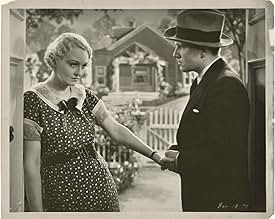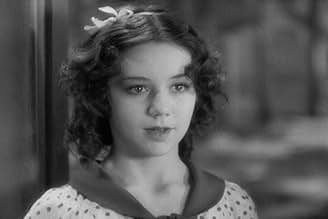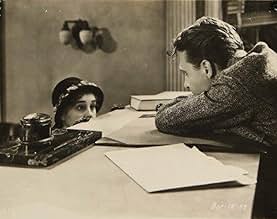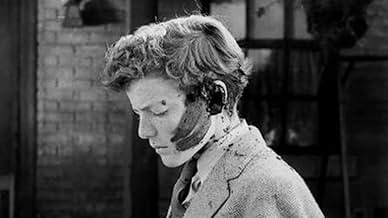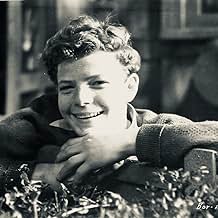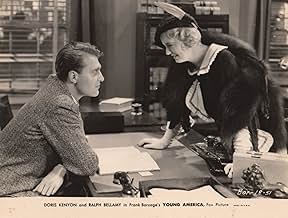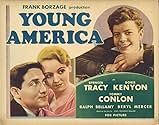Ajouter une intrigue dans votre langueAlready in trouble with the law, Arthur and his friend Nutty break into a drugstore to get medicine for Nutty's grandmother. The druggist's wife, Mrs. Doray, asks for custody. When he hears ... Tout lireAlready in trouble with the law, Arthur and his friend Nutty break into a drugstore to get medicine for Nutty's grandmother. The druggist's wife, Mrs. Doray, asks for custody. When he hears them arguing over him, Arthur runs away. When he returns Mr. Doray is being held up by ban... Tout lireAlready in trouble with the law, Arthur and his friend Nutty break into a drugstore to get medicine for Nutty's grandmother. The druggist's wife, Mrs. Doray, asks for custody. When he hears them arguing over him, Arthur runs away. When he returns Mr. Doray is being held up by bandits at the drugstore.
- Réalisation
- Scénario
- Casting principal
- Récompenses
- 1 victoire au total
- Arthur Simpson
- (as Tom Conlon)
- Mabel Saunders
- (as Dawn O'Day)
- Maid
- (non crédité)
- Schoolteacher
- (non crédité)
- Aunt Mary's baby
- (non crédité)
- Cassie Taylor
- (non crédité)
- Undetermined Role
- (non crédité)
- Bull Butler
- (non crédité)
- Bandit
- (non crédité)
- Court Clerk
- (non crédité)
- Bandit
- (non crédité)
Avis à la une
The director's on-screen surrogate is Ralph Bellamy, introduced in the opening sequence as a progressive judge who makes it his business to listen to the boys, find out why they misbehave, and dole out appropriate sentences. He's fair but no pushover, and when one well-dressed boy smoothly delivers his testimony with a grin he astutely identifies the kid as a con artist. You know Bellamy's judge is a good guy from the way he sits at the judicial bench: he isn't ramrod straight, he slouches, parks his elbow on the desktop and props his head on his hand, listening intently as he leans towards the speaker. If you ever get in trouble and wind up in court, this is the kind of judge you'd want to face.
The central figure is an orphaned boy named Arthur Simpson, who is being raised in squalor by a cold-hearted aunt with no husband and three children of her own. Art is in trouble constantly, but his motives are usually good onesso much so that, after a while, our credulity is strained. A well-heeled lady named Edie Doray takes a sympathetic interest in the boy and volunteers to take him into her home as her ward, despite the vocal opposition of her perennially grouchy husband Jack, the proprietor of a drug store. After various complications and much suffering for young Art, who seems to be a magnet for trouble, the boy redeems himself (in a wildly implausible, action-packed finale) and everyone, even Jack Doray, comes to recognize his good qualities.
"Young America" starts well and holds viewer interest much of the way, but problems kick in around the midway point as the story turns increasingly improbable and sentimental. Tommy Conlon is quite good as Arthur Simpson, but the character as written is impossibly noble, forever misunderstood and put-upon. In the face of injustice Art maintains a disturbing, Job-like passivity. Several times the locals refer to him as "the worst boy in town," and if that's true they're awfully lucky. Mickey Rooney's character in "Boy's Town" is more of a hardened troublemaker than this guy. Most kids in Art's position would be openly angry and raise a lot more hell than he ever does, and a stronger screenplay might have granted him more nuance, but like Father Flanagan the writers of "Young America" seem to believe there's no such thing as a bad boy (well, except for a couple of bad eggs we meet briefly along the way) and are determined to prove that all these kids need is the opportunity to explain themselves and a second chance in life, and everything will be fine. If only life could be so simple!
Speaking of Father Flanagan the biggest lure this film has to offer modern day viewers is the performance of 32 year-old Spencer Tracy as Jack Doray, the druggist. It's a little strange to see Tracy this young, but the regular-guy gruffness and authoritative voice so familiar from his later movies are present, and he demonstrates with ease that he already had the acting chops to breathe life into an ill-defined character. Tracy was under contract to Fox Films during the first five years of his movie career, 1930-35, and was said to be unhappy with most of the projects he was assigned; it's safe to assume that this was one of the roles he didn't like. We're never told much about Jack Doray. We never learn why he's such a grouch or why he takes an instant dislike to Art Simpson, or for that matter why his wife puts up with him. When, in the final scenes, Doray suddenly sees the light and recognizes Art's goodness, only an actor of Tracy's caliber could make the turnabout feel at all credible.
The finale involves a stick-up by crooks and a crazed car chase staged mostly before rear-projection screens, and it bears so little resemblance to what we've been watching it feels as if it was spliced in from a different movie. (Amusingly, the original posters and lobby cards for the film emphasized this sequence, which must have left more than one ticket-buyer bewildered and disappointed.) It concludes the show on a rousing note, but also reminds us that while "Young America" is a moderately interesting viewing experience it doesn't live up to the promise of its opening scenes.
*** (out of 4)
Uneven but entertaining drama has teen Arthur (Tommy Conlon) being accused of being the worst kid in town. Trying to help a friend's grandmother, he breaks into a store to steal some medicine but is caught. In court the judge (Ralph Bellamy) is about to send him to a juvenile jail but the store owner (Spencer Tracy) and his wife (Doris Kenyon) end up taking the kid home. The store owner is against it but the wife believes a good home can change a bad kid. This is a fast paced and entertaining little film even though the subject matter brings up some rather false notes as well as being too heavy at times. The biggest fault I had with the movie is that it tries to argue that bad kids can be good if they have a loving family and a nice place to live yet the main guy here, Arthur, isn't ever shown as a bad kid. He gets in trouble two separate times but both times he does so for the good of another person. Since he's doing good deeds it's hard for the film to argue about what bad kids need. With that said, the movie still works due in large part to some very good performances. Tracy gets top-billing but he's basically just here in a supporting role. He offers up another fine performance as he has no trouble playing the jerk who wants to see the young kid thrown in jail. Kenyon is equally good as the woman who wants to change the kid. Conlon never had much of a career, which is somewhat a surprise since his performance is better than many other child stars of his time. The director's son plays Arthur's best friend and does a nice job as well. Ralph Bellamy gets third viewing but this is pretty much his film as a judge who tries to understand troubled kids. The caring nature of the character is really brought out by Bellamy who sadly has been forgotten as an actor, which is a shame because he was one of the best character actors out there.
The film begins with a do-gooder (Doris Kenyon) meeting with a juvenile court judge (Ralph Bellamy) on behalf of some civic betterment group. She requests to sit in on the court's proceedings to learn about the problems facing kids. He gladly lets her and one of the cases seems to really affect her--the supposedly 'worst kid in town'--Art (Tommy Conlon). However, instinctively she KNOWS he's misunderstood and worth redeeming. Through some ridiculous chain of events, she eventually gains custody of the boy--much to the consternation of her husband (Spencer Tracy) who thinks the kid is a crook! While there is a lot to the story after that, in the end the couple learn that Art is one swell kid and they all live happily ever after---a bit like Curious George, actually!
There are two main problems about this film that keep it from approaching the quality of the Warner films. First, while Art has a good heart, he's also amazingly stupid--and it's hard to like stupid people! Again and again, he COULD go to adults and ask for help and again and again he does things on his own that are selfless but sure look bad! You'd think the idiot would get the idea that MAYBE he should ask for help first! And, when he's caught, he doesn't even try to explain why he did what he did. In essence, he's got the brain of Mr. Potatohead! Second, while ALL these sort of films are preachy and a tad naive, this one comes off as much, much more so than usual--especially in the preachy department. The subtlety and charm of the Warner films is missing--despite having a very good director, Frank Borzage, at the helm. It was as if this accomplished man had no idea what to do with this sort of film.
My advice, then, is watch any one of a couple dozen Warner films instead. The three listed above would be a good start, but "Mayor of Hell" or "Angels Wash Their Faces" or "Crime School" would also be well worth your time. Skip "Young America"--it's tough to believe, comes on way too strong and simply is second-rate.
Borzage manages to get some interesting performances out of the young actors: Tom Conlan, whose character is labeled as the worst boy in town, keeps getting into thoughtless scrapes. In fact, that's the best part of the script: the boys are not bad, but they just don't think of consequences.
The other thing about this movie that makes it better than average is, unsurprisingly, Spencer Tracy's performance. In the midst of all the sweet characters and one outright stinker, he adds a lot of salt to the stew as the grouchy pharmacist. His scene with Bellamy in which he continually gets fined for contempt of court is very funny. While not among Borzage's best work, this movie, as always, has enough points to make it worth your time.
The film belongs to Tommy Conlan and Raymond Borzage. Tommy comes from a real white trash background and he's got a lot of anger issues and who wouldn't if I lived as an orphan with his aunt Sarah K. Padden who is hardly the nurturing type. Conlan finds it a lot more congenial with his friend Borzage's family which is his grandmother Beryl Mercer. Conlan by a certain consensus is supposedly the worst kid in the city. Yet people like Judge Ralph Bellamy and Doris Kenyon wife of pharmacist Spencer Tracy see something good and salvageable.
In a new biography of Spencer Tracy it's states that while Tracy was glad to work with director Frank Borzage he was clearly not happy with Fox Studios assigning him to a supporting role in reality if not in billing. Later on when he was assigned and billed accordingly such a role in Captains Courageous to Freddie Bartholomew he walked off with his first Oscar. But he's given little opportunity or time on the screen to do that here.
Conlan and young Borzage (he's the director's nephew) really register well. Borzage is what today would be termed a nerd yet he and Conlan because of Mercer's affection for Conlan form a very nice Tom Sawyer/Huck Finn type bond. Frank Borzage has come down to us as a director of tender and sometime tragic love stories. He puts that skill to work with great effectiveness here. Tommy and Raymond enact a tender death scene that would rival what Borzage did with Margaret Sullavan in Three Comrades and The Mortal Storm a couple of better known Borzage works at MGM. I was deeply moved by it.
Fox Studios was having its financial problems during the Great Depression and didn't invest much in production values for Young America. Spencer Tracy was a B picture star for the most part. In the last days of Fox Films before they merged with 20th Century Pictures the A list stars were Will Rogers and Janet Gaynor. Still Young America is a poignant story and credit goes to the great chemistry and great acting of Tommy Conlan and Raymond Borzage.
Le saviez-vous
- AnecdotesDespite receiving top billing, Spencer Tracy appears in only about 19 minutes, or roughly 27 percent of the film.
- Citations
Judge Blake: Washington Lincoln Jackson?
Washington Lincoln Jackson: Yes, sir.
Judge Blake: Have you ever been here before?
Washington Lincoln Jackson: No sir. And I wouldn't be here now 'lessin' I was forced to come.
Judge Blake: I suppose you know why Officer Weems arrested you.
Washington Lincoln Jackson: Yessir. Because I was the smallest kid he could catch.
- ConnexionsRemake of Young America (1918)
Meilleurs choix
Détails
- Durée
- 1h 10min(70 min)
- Couleur
- Rapport de forme
- 1.37 : 1

